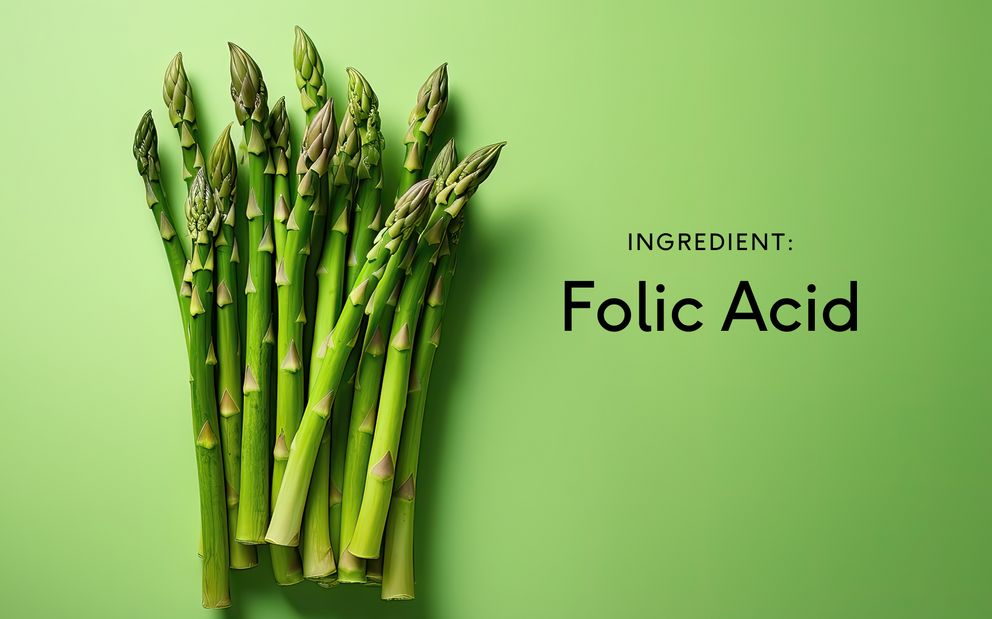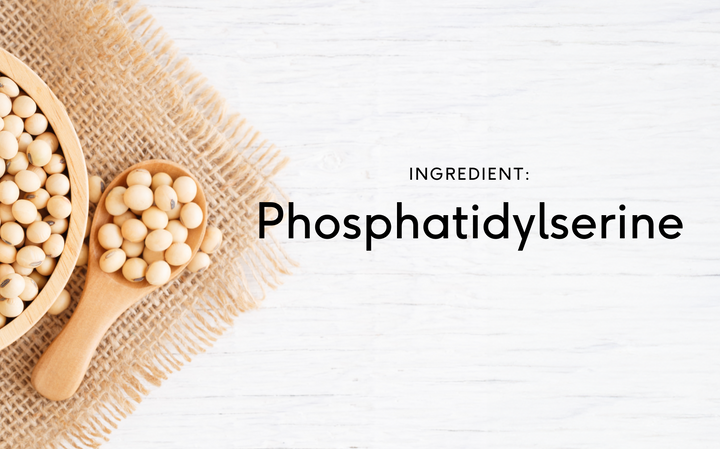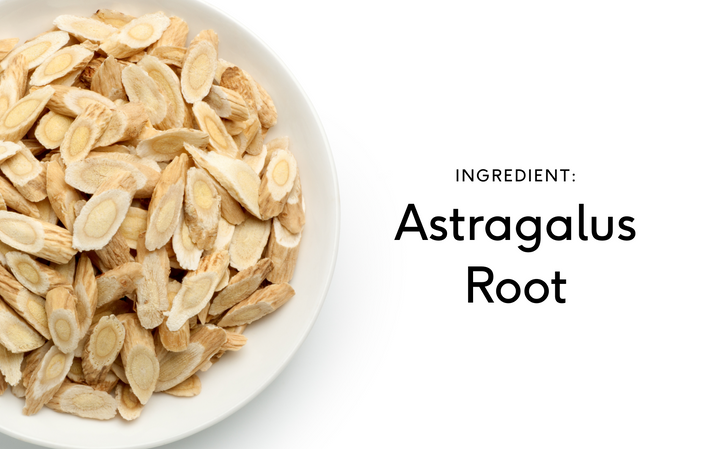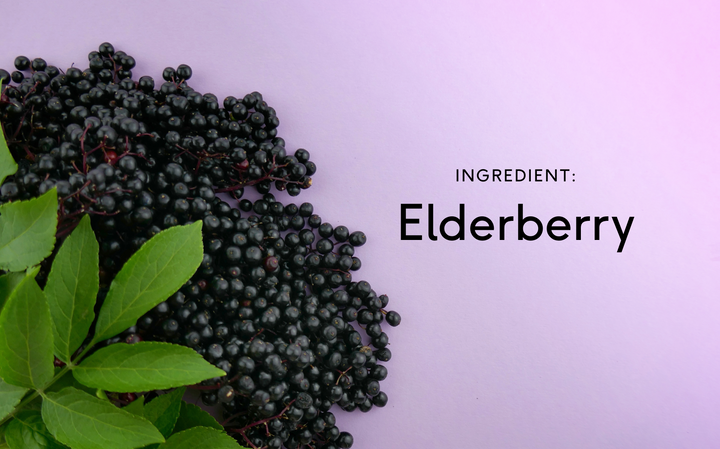Learn About Folic Acid (Vitamin B9) in 5 minutes
Table of contents

What is vitamin B9?
Vitamin B9, also known as folic acid or folate, is a critical component of the B vitamin complex, which regulates energy production in the body. Folic acid reduces the risk of congenital conditions, and it may prevent depression, and schizophrenia.
- Keeps the female reproductive system running smoothly to promote infant health
- May reduce the risk of autism
- Can reduce the likelihood of congenital conditions like cleft palate
- Reduces homocysteine levels to prevent cardiovascular conditions
- Controls gene expression
- May fight back against depression and schizophrenia
Why we love folic acid
Folic acid, also known as vitamin B9, is an essential component of the energy-producing B vitamin complex. With the other B vitamins, vitamin B9 helps your body transmit glucose to your organs and tissues, which provides energy and spurs cellular repair and development.
This profoundly powerful vitamin has several benefits that are all its own. For instance, every pregnant woman should consume plenty of folic acid, and this vitamin controls when your body turns genes on and off. What’s more, vitamin B9 reduces the risk of cardiovascular disease by eliminating homocysteine, and this vitamin may even prevent conditions like autism, schizophrenia, and depression. All things considered, it’s clear why we just had to include folic acid in Feel.
Unbelievable benefits of folic acid
In addition to its reproductive benefits, folic acid can also help your body thrive in a variety of impressive ways. Here are some of the key findings of vitamin B9 research:
Reproductive Benefits
Even if you aren’t pregnant, you should take folic acid supplements if there’s any chance that you might conceive a baby. When you don’t consume enough folic acid before and during pregnancy, your baby has higher chances of developing neural tube defects, and these defects can cause paralysis or even death in infants. On the other hand, the babies of women who take adequate amounts of folic acid per day have significantly lower rates of these harmful defects.
Feel Pregnancy contains 400μg of body-ready folic acid (folate), providing 100% of the recommended daily folic acid intake for women during pregnancy, to help prevent birth defects.
Cardiovascular Benefits
Along with other vitamins in the B complex, folic acid reduces the levels of homocysteine in your body, which can contribute to various cardiovascular diseases. While other factors also contribute to the development of heart disease, reducing your homocysteine levels is an effective way to defend your body against atherosclerosis and heart attacks.
Neurological Benefits
Preliminary research suggests that mothers who supplement with folic acid are less likely to give birth to children who develop autism. Scientists also believe that vitamin B9 may help patients recover from depression, and it’s possible that this nutrient could boost recovery from other psychiatric conditions.
Other Benefits
Research shows that folic acid might help your body repair and synthesize RNA and DNA, which keeps your tissues healthy throughout your body. This effect helps your cells repair and grow, and folic acid also appears to play a role in preventing hearing loss in elderly people. Additionally, common pharmaceutical treatments for rheumatoid arthritis cause folic acid deficiency, so supplementing with vitamin B9 when you’re taking these medications can help you stay healthy.
Is vitamin B9 water-soluble or fat-soluble?
Like the other B vitamins, vitamin B9 is water-soluble. Therefore, the body processes it quickly, and it’s necessary to frequently regenerate your folic acid stores to avoid deficiency.
Where can vitamin B9 be found naturally? Common sources of vitamin B9:
Folate is present in green, leafy vegetables like spinach, chard, and kale. This essential nutrient is also present in citrus fruits and grain products, such as bread, cereal, and pasta, that have been fortified with folic acid and other B vitamins. Beef liver is an example of an animal source of folate.
5 foods/drinks containing vitamin B9
1. Beef liver 54% DV per 85g
2. Spinach 33% DV per ½ cup or 64g
3. Black-eyed peas 26% DV per ½ cup or 64g
4. Asparagus 22% DV per 4 spears or 70 grams
5. Brussels sprouts 20% DV per ½ cups or 64g
What is the recommended daily intake for vitamin B9?
The recommended daily amount (RDA) for folic acid is 400mcg for adult men and women. Pregnant women need to ingest 600mcg of vitamin B9 per day, and breastfeeding women need to ingest 500mcg per day.
Feel Multivitamin contains 200μg of Folic Acid, providing 100% of your recommended daily folic acid intake, ideal for supporting energy and reducing the risk of cardiovascular disease.
What to consume to get a full daily dose of vitamin B9?
Beef liver - approximately 160g
Spinach - approximately 190g. More folate is released when spinach is boiled
Black-eyed peas - approximately 250g
Asparagus - approximately 20 spears or 350g
Brussels sprout - approximately 320g
Can you absorb enough of vitamin B9 from food?
Among all the essential vitamins and minerals, folate is one of the easiest to absorb from food. This substance is readily available in a wide variety of different foods, and vegans and vegetarians have the option of getting their daily folate intake from vegetable sources like spinach and kale. On the other hand, busy lifestyles often make it hard to eat healthy meals every day, so it might be best to make sure you get enough vitamin B9 by taking a supplement.
Why is vitamin B9 necessary for your body?
Folate is critically involved in the production of red blood cells, and it is also involved in producing and repairing RNA and DNA, which are the building blocks of cell replication throughout the body. In particular, pregnant women must consume recommended amounts of folate to prevent neural tube defects and other birth defects. There’s even evidence suggesting that adequate folate consumption when pregnant may reduce your chances of giving birth to an autistic child.
Functions of vitamin B9
Reproductive functions: Promotes healthy pregnancies and prevents birth defects.
Energy and cardiovascular functions: Helps prevent anaemia by supporting red blood cell production.
Neuroprotective functions: Defends against neurodegenerative disorders and psychosis.
DNA functions: Folate has DNA-protective attributes.
Symptoms of vitamin B9 deficiency
Anaemia
Vitamin B9 deficiency results in anaemia, which is a condition in which your blood is not able to deliver adequate amounts of oxygen to your tissues. Symptoms of folate anaemia include fatigue, shortness of breath, and skin paleness.
Premature Hair Greying
Deficiency in folate can make your hair grey prematurely. This symptom is more common in adults, and it only happens in children or adolescents in instances of severe deficiency.
Developmental Issues in Children
Lack of folate consumption by the mother can result in birth defects, and children who do not consume enough folic acid display stunted growth and learning disorders.
How long do you need to take vitamin B9 to start experiencing its benefits?
You may feel some benefits from taking folic acid within 24hrs. However, it can take up to 2 weeks to experience the full benefits of this nutrient.
Consistency is key and our research recommends taking your Feel supplements for at least 3 months to allow your body to adjust and provide the desired benefits.
How long does it take for your body to digest/absorb vitamin B9?
Supplemental folic acid has an 85% absorption rate when taken with food, and this rate drops to 50% when you take vitamin B9 without a meal. As long as you take folic acid with food, the vast majority of this nutrient will absorb within 24 hours.
How long does vitamin B9 stay in your body after you take it?
As a water-soluble vitamin, folate is rapidly processed out of your body. Most of the folate you consume will be excreted within 24 hours, and any trace amounts will be excreted soon after except in cases of severe overdose.
Is vitamin B9 an antioxidant?
Some research suggests that folate may act as an indirect antioxidant. While this nutrient does not have any direct antioxidant effects, it may reduce levels of oxidative stress and promote cellular homeostasis anyway.
Can you overdose on vitamin B9? What are the effects?
Since folic acid is a water-based nutrient, it is highly difficult to overdose on this substance. Consuming too much folic acid may reduce this nutrient’s rate of absorption, and common symptoms of folic acid overdose include temporary anaemia, diarrhoea, and nausea or vomiting.
In most cases, symptoms resolve within 24 hours, but severe folic acid overdose may last for a week or more. Avoid folic acid overdose by getting exactly 100% of your RDA of this nutrient with Feel.
Does vitamin B9 dissolve, flush out, or build up in the body?
Folate rapidly flushes out of your body. Except in cases of extreme overdose, this nutrient does not build up in your tissues.
Can you take vitamin B9 during a diet?
Vitamin B9 does not interfere with any dietary restrictions. Vegans and vegetarians cannot consume liver, which is the most concentrated source of natural folate.
Are there synthetic forms of vitamin B9?
While the terms vitamin B9, folic acid, and folate are used interchangeably, “folic acid” actually refers to pteroylmonoglutamic acid, which is the synthetic form of folate. 5-methyltetrahydrofolate (5-MTHF) is another form of supplemental folate that may have a better absorption rate than folic acid.
Why might synthetic forms of vitamin B9 be better?
It was originally believed that folic acid absorbed better than natural folate, but it turns out that both synthetic and natural vitamin B9 have similar absorption rates. Folic acid is also less expensive than natural folate.
Absorption rate of synthetic vitamin B9
While the absorption rate for natural folate is 100%, the absorption rate for folic acid is 85%.
Why might natural forms of vitamin B9 be better?
Natural folate does not need to be processed by the liver to become bioavailable. Additionally, overdosing on synthetic vitamin B9 can lead to increased levels of folic acid in the blood, which can cause health conditions.
How to take vitamin B9
Folate is naturally available in many foods, and you can also consume this substance by taking supplements.
Vitamin B9 trends in medicine
Medical researchers continue to find new uses of folate, and just recently, scientists discovered that adequate vitamin B9 consumption reduces your chances of developing gestational diabetes, which is a common pregnancy-related issue.
Why everyone should be taking WeAreFeel supplements
Vitamin B9 is a complicated nutrient. While it’s best to get this substance from food, it’s easy to develop folate deficiency if your diet isn’t the best, which can ruin your energy levels and even increase your risk of developing diseases. Plus, folic acid overdose can reduce absorption rates of this essential nutrient. Instead of dabbling with fortified foods and dietary folate, rest easy knowing you got exactly how much folate your body needs with a daily capsule of Feel!
Here’s the Proof
- Folic Acid Food Fortification—Its History, Effect, Concerns, and Future Directions
- Folic Acid Supplementation for the Prevention of Neural Tube Defects: US Preventive Services Task Force Recommendation Statement.
- Folate and DNA Methylation: A Review of Molecular Mechanisms and the Evidence for Folate's Role
- Folate deficiency causes uracil misincorporation into human DNA and chromosome breakage.
- Role of homocysteine in the development of cardiovascular disease
- Maternal periconceptional folic acid intake and risk of autism spectrum disorders and developmental delay in the CHARGE (Childhood Autism Risks from Genetics and Environment) case-control study
- Enhancement of recovery from psychiatric illness by methylfolate.
- The metabolic processes of folic acid and Vitamin B12 deficiency
- Age-related hearing loss, vitamin B12, and folate in the elderly.




















































 Back
Back





